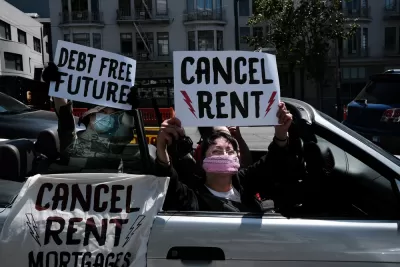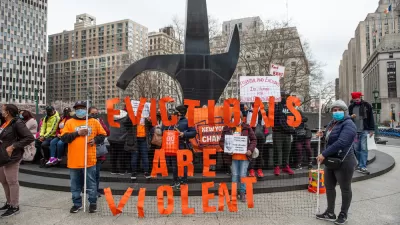A new survey reveals details about the financial crunch facing owners of small rental properties as tenants struggle to pay rent during the pandemic and emergency aid is slow to reach those in need.

A study written by Dr. Nathaniel Decker and published recently by the Terner Center for Housing Innovation at UC Berkeley measures the impact of the pandemic on landlords and tenants on small rental properties (i.e., one- to four-unit properties).
About half of U.S. renters live in small properties, according to the article, and most of those properties are owned by non-professional landlords. "Despite their prevalence, very little data are available on this segment of the housing market, which has made it difficult to understand how small rental property owners and tenants have fared over the past year," according to the article.
To fill that research gap, Decker collected survey responses from 1,690 rental property owners and managers in mid-sized U.S. metropolitan areas.
The study shows that the economic consequences of the pandemic have been deeply uneven. Respondents reported that more than 1 in 5 tenants fell behind on rent during the pandemic, with lower-income and Black tenants hardest hit by shortfalls. Overall, about 1 in 3 small rental property owners reported revenue declines in 2020, but shares climbed even higher for owners of 6 to 10 units or more and for landlords of color.
While many tenants missed rent only temporarily and have since become current, about 15% had severe delinquencies of 6 or months. The median arrears owed by tenants was about $2,200, but estimated back rents were wide ranging, with some tenants owing $4,000 or more.
The survey results also identified an "emerging and troubling" trend in the increased sale of small rental properties, which could have long-term consequences for the nation's supply of low-cost properties in high-opportunity neighborhoods.
Finally, the study suggests that emergency rent relief efforts will have to be more effective to deliver on their potential to stabilize rental housing markets in the United States.
FULL STORY: The Uneven Impact of the Pandemic on the Tenants and Owners of Small Rental Properties

Planetizen Federal Action Tracker
A weekly monitor of how Trump’s orders and actions are impacting planners and planning in America.

Maui's Vacation Rental Debate Turns Ugly
Verbal attacks, misinformation campaigns and fistfights plague a high-stakes debate to convert thousands of vacation rentals into long-term housing.

Restaurant Patios Were a Pandemic Win — Why Were They so Hard to Keep?
Social distancing requirements and changes in travel patterns prompted cities to pilot new uses for street and sidewalk space. Then it got complicated.

In California Battle of Housing vs. Environment, Housing Just Won
A new state law significantly limits the power of CEQA, an environmental review law that served as a powerful tool for blocking new development.

Boulder Eliminates Parking Minimums Citywide
Officials estimate the cost of building a single underground parking space at up to $100,000.

Orange County, Florida Adopts Largest US “Sprawl Repair” Code
The ‘Orange Code’ seeks to rectify decades of sprawl-inducing, car-oriented development.
Urban Design for Planners 1: Software Tools
This six-course series explores essential urban design concepts using open source software and equips planners with the tools they need to participate fully in the urban design process.
Planning for Universal Design
Learn the tools for implementing Universal Design in planning regulations.
Heyer Gruel & Associates PA
JM Goldson LLC
Custer County Colorado
City of Camden Redevelopment Agency
City of Astoria
Transportation Research & Education Center (TREC) at Portland State University
Jefferson Parish Government
Camden Redevelopment Agency
City of Claremont




























